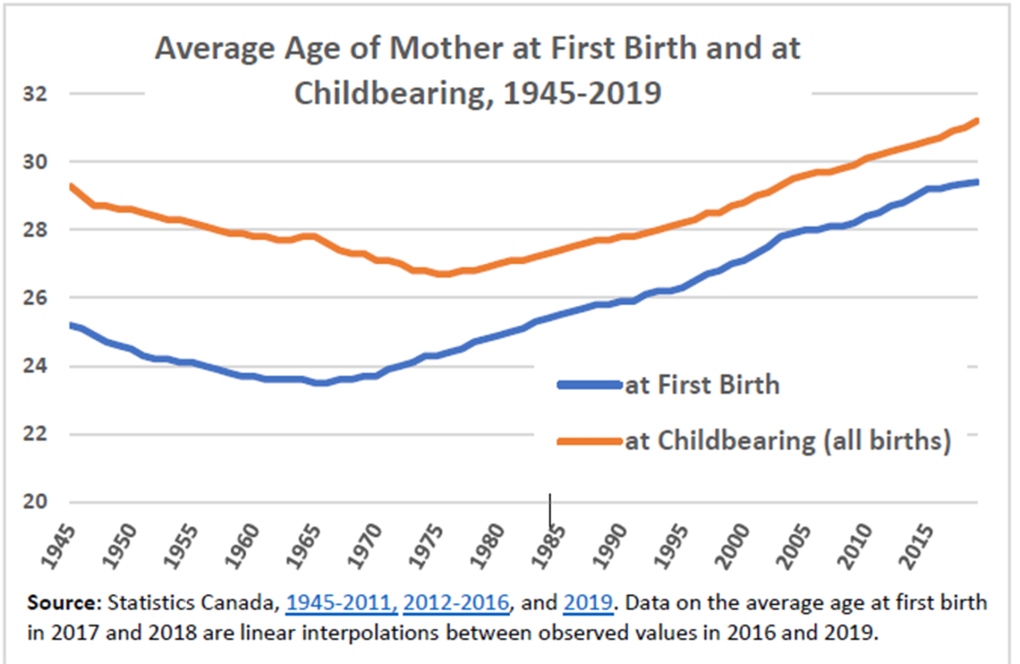Alberta women are waiting to become moms: report
 (Supplied/Pexels)
(Supplied/Pexels)
First-time mothers in Alberta are steadily increasing in age, suggests new data from the University of Calgary.
Researchers with the School of Public Policy analyzed historical data from all Canadian provinces over 54 years and found first-time moms are getting older, especially here in Alberta.
In its report, in 1965 a woman’s average age was 23.5 years, as compared to 29.4 years in 2019, officials said.
Since 2012, across every province, the age of mothers giving birth for the first time has increased, the greatest jump being recorded in Alberta, by 1.1 years and the least in Quebec, by 0.4 years.
“The fact they continue unchanged through economic booms and busts and across all provinces suggests that these trends have more to do with changing societal norms than with financial considerations, such as the cost of living and the cost of childcare,” stated the report.
“Financial considerations are more likely the culprit for explaining differences across provinces than they are for explaining these 50-year long trends.”
For example, researchers point to the fact that the average age of mothers at first birth is highest in provinces like British Columbia and Ontario, where the cost of living has been consistently higher than in other provinces.
The report authors say it’s important to track the ages of first-time mothers as many public policies, including school construction, the financing of pensions, and immigration targets are considered based on this data.
“International data shows that amongst OECD countries, the average age of Canadian mothers at first birth in 2016 was near the OECD average (29.2 years), but noticeably lower than in countries like Spain (30.8) and Italy (31.0),” stated the report.
 The positions of the two lines differ because the average mother over this period gave birth to more than one child. The vertical distance between the lines gets smaller when the average mother has fewer children and/or when the time between births grows shorter. (Supplied)
The positions of the two lines differ because the average mother over this period gave birth to more than one child. The vertical distance between the lines gets smaller when the average mother has fewer children and/or when the time between births grows shorter. (Supplied)
Unemployment rate of Alberta women dropping
Press secretary for Alberta's Minister of Arts, Culture and the Status of Women Tanya Fir said there is no hard data connecting the increase of women working with having children later in life.
"Alberta's government has been working to ensure women are able to fully participate in our province's economy in the careers they want," said Garrett Koehler in a statement on Wednesday.
Koehler said the UCP government has provided for a number of ways for women to gain the skills they need to join the workforce such as grant funding to open doors in underrepresented industries, assisted women in removing barriers to employment, supporting Indigenous women's entrepreneurship and funding to a number of non-profits that work to support women's economic participation and gender equality.
"Further, Statistics Canada data shows that from April 2019 to February 2024, the unemployment rate of Alberta women dropped from 5.8 per cent to 4.7 per cent.
"Our efforts are working, and we will continue to engage with community leaders to ensure we find and fund new ways to support women's economic participation in Alberta."
CTVNews.ca Top Stories

'The world is too messy for bureaucratic hurdles': Canada still bars Afghanistan aid
Ottawa has plans to finally stop blocking Canadian development aid to Afghanistan this year.
Student anti-war protesters dig in as faculties condemn university leadership over calling police
Students protesting the Israel-Hamas war at at universities across U.S., some of whom have clashed with police in riot gear, dug in Saturday and vowed to keep their demonstrations going, while several school faculties condemned university presidents who have called in law enforcement to remove protesters.
Toxic testing standoff: Family leaves house over air quality
A Sherwood Park family says their new house is uninhabitable. The McNaughton's say they were forced to leave the house after living there for only a week because contaminants inside made it difficult to breathe.
Hamas is reviewing an Israeli proposal for a ceasefire in Gaza, as possible Rafah offensive looms
Hamas said Saturday it was reviewing a new Israeli proposal for a ceasefire in Gaza, as Egypt intensified efforts to broker a deal to end the months-long war and stave off a possible Israeli ground offensive into the southern Gaza city of Rafah.
Cisco reveals security breach, warns of state-sponsored spy campaign
State-sponsored actors targeted security devices used by governments around the world, according to technology firm Cisco Systems, which said the network devices are coveted intrusion points by spies.
I just don't get Taylor Swift
It's one thing to say you like Taylor Swift and her music, but don't blame CNN's AJ Willingham's when she says she just 'oesn't get' the global phenomenom.
opinion RFK Jr.'s presidential candidacy and its potential threat to Biden and Trump
Although it's still unclear how much damage Robert F. Kennedy Jr.'s candidacy can do to either Joe Biden or Donald Trump this election, Washington political columnist Eric Ham says what is clear is both sides recognize the potential threat.
More than 115 cases of eye damage reported in Ontario after solar eclipse
More than 115 people who viewed the solar eclipse in Ontario earlier this month experienced eye damage after the event, according to eye doctors in the province.
Russia renews attacks on the Ukrainian energy sector as Kyiv launches drones at southern Russia
Russia launched a barrage of missiles against Ukraine overnight, in attacks that appeared to target the country's energy infrastructure. Meanwhile, Russia said its air defense systems had intercepted more than 60 Ukrainian drones over the southern Krasnodar region.
































